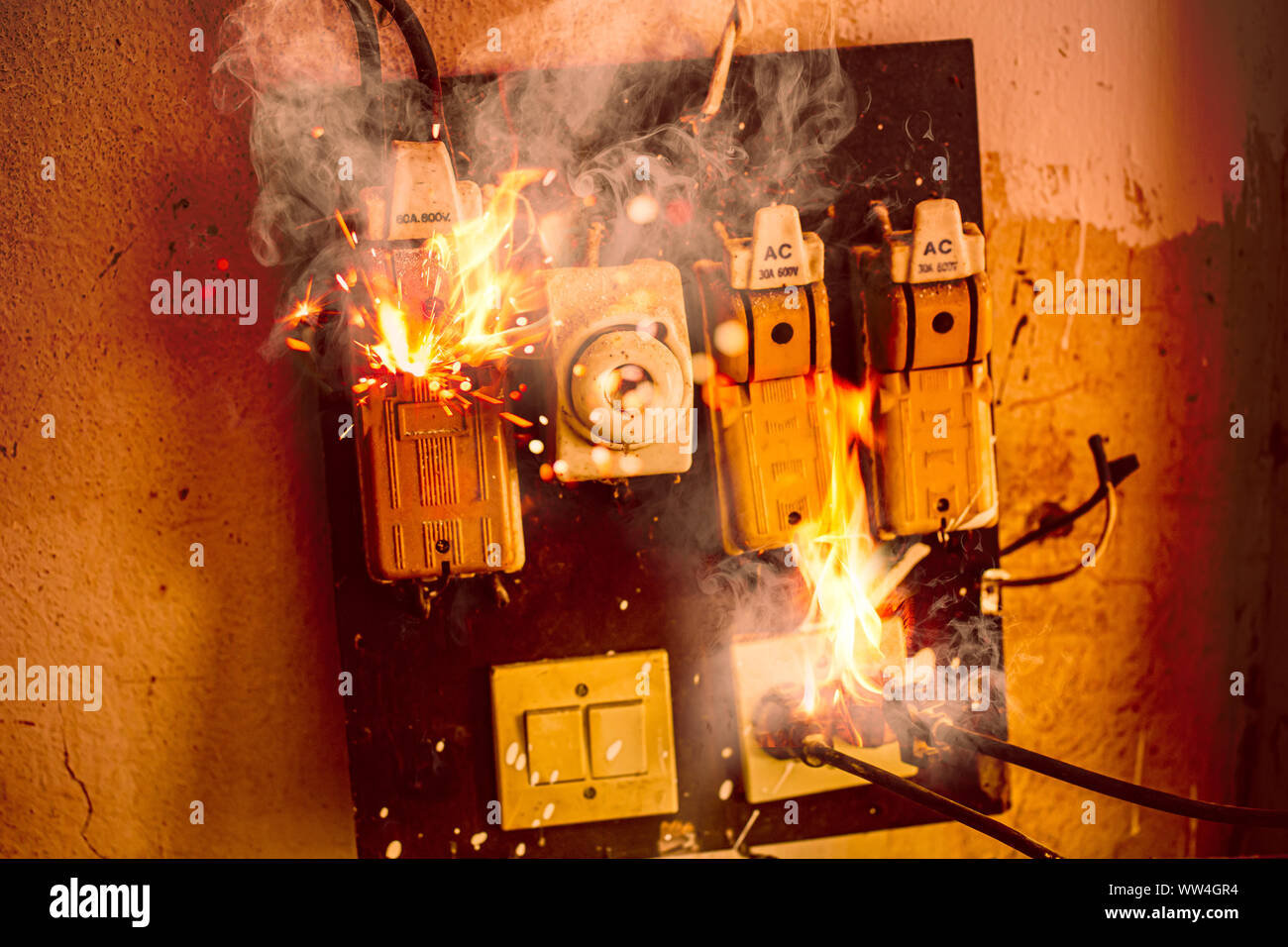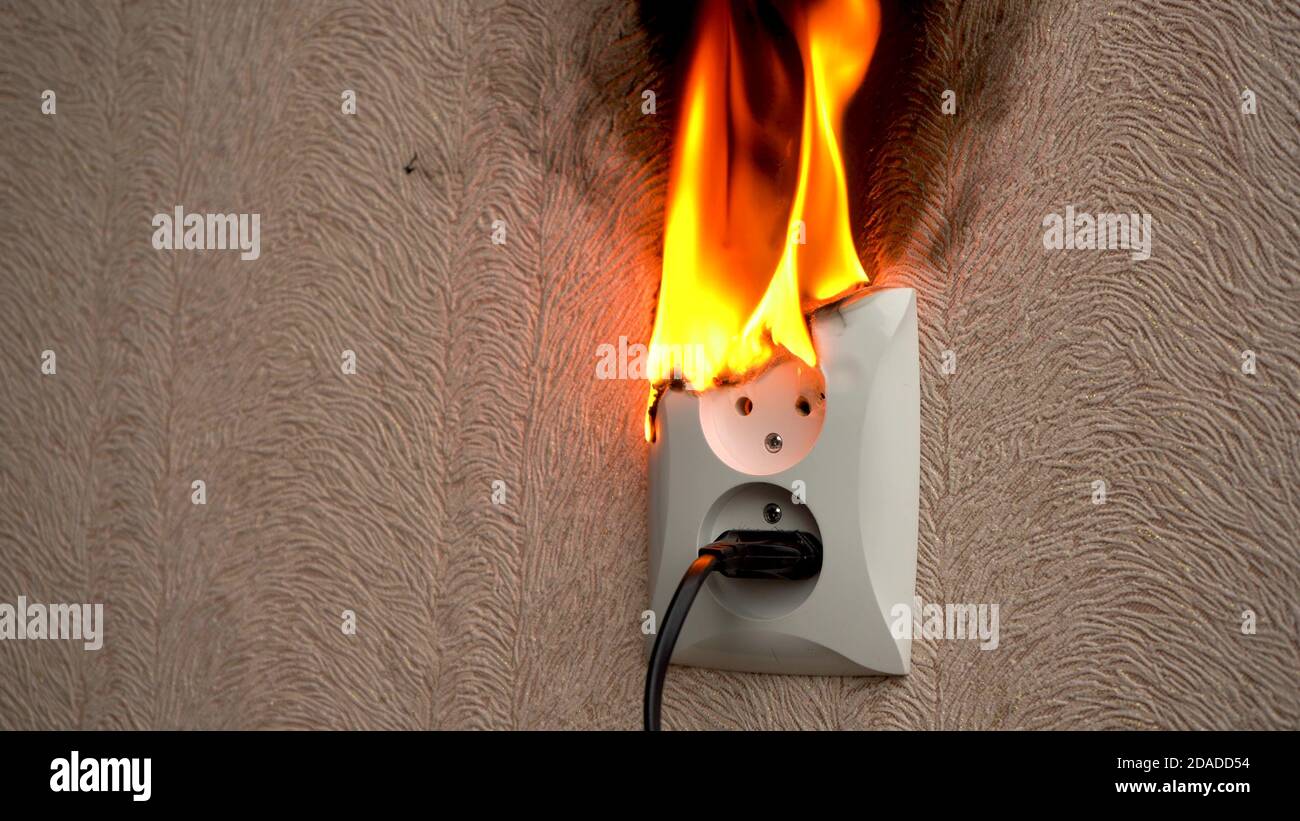Exemplary Tips About How To Make A Short Circuit Fire

ELECTRICAL FIRE DUE TO SHORT CIRCUIT & SAFETY Part 4
The Dangerous Dance
1. Understanding the Risks
Okay, let's be crystal clear right off the bat: this article is not a guide on how to intentionally start a fire. Instead, it's about understanding the very real dangers of short circuits and why they can lead to fire. We're talking about electrical safety, preventing accidents, and knowing what to do if something goes wrong. Playing with electricity is like juggling chainsaws — not a good idea unless you know precisely what you're doing (and even then, why?).
A short circuit, in essence, is an unintended path for electrical current to flow. Instead of following the designed route through a device, the electricity takes a shortcut, often through a point of low resistance. This sudden surge of current generates a massive amount of heat. Think of it like trying to force a river through a garden hose — things are going to get messy, and in this case, potentially fiery.
The heat produced by a short circuit can easily ignite flammable materials nearby. Think of all the things in your home that can burn: curtains, carpets, furniture, paper, and even dust. A small spark from a faulty wire can quickly turn into a raging inferno if it comes into contact with any of these materials.
Moreover, short circuits can damage your electrical system, leading to costly repairs and further increasing the risk of fire. Wires can melt, insulation can break down, and circuit breakers can fail. It's a domino effect of disaster waiting to happen. The goal of this piece is to give you the knowledge you need to keep your home safe and prevent short circuits from becoming a real problem.

Why Short Circuit Causes Fire L Hazard Basic
The Anatomy of a Spark
2. Pinpointing the Culprits
So, what exactly causes these electrical mishaps? There are several common culprits. One of the most frequent offenders is damaged wiring. Over time, the insulation on wires can crack, fray, or simply wear away. This exposes the bare wires, making them vulnerable to touching each other or other conductive surfaces, leading to a short circuit.
Another common cause is overloaded circuits. Every circuit in your home is designed to handle a specific amount of electrical current. If you plug too many devices into a single circuit, you're essentially asking it to do more work than it's capable of. This can cause the wires to overheat, potentially melting the insulation and causing a short circuit. Think of it like trying to cram too many suitcases into an already full trunk something's going to give.
Faulty appliances are also a significant risk. If an appliance has internal wiring problems, it can create a short circuit when you plug it in. This is why it's important to regularly inspect your appliances for any signs of damage, such as frayed cords, loose connections, or unusual smells.
Finally, water and electricity are a dangerous combination. If water comes into contact with exposed wires or electrical components, it can create a path for electricity to flow, leading to a short circuit and potentially electrocution. Always be careful when working with electricity near water sources, and never use electrical appliances with wet hands.

Short Circuit Fire Burn Danger Of Old Electrical Wire Plug And Broken
Prevention is Key
3. Taking Proactive Steps
The best way to deal with a short circuit is to prevent it from happening in the first place. Regular maintenance and a bit of common sense can go a long way in keeping your home safe. One of the most important things you can do is to regularly inspect your electrical system. Check for any signs of damage, such as frayed wires, loose connections, or cracked outlets. If you notice anything amiss, have it repaired by a qualified electrician as soon as possible.
Avoid overloading circuits. Be mindful of how many devices you're plugging into each circuit, and use power strips with surge protection to help prevent overloads. If you frequently trip circuit breakers, it's a sign that you're overloading the circuit and need to redistribute your devices.
Use appliances safely. Read the manufacturer's instructions carefully before using any appliance, and never use an appliance if it's damaged or malfunctioning. Keep appliances away from water, and always unplug them when you're not using them.
Install arc-fault circuit interrupters (AFCIs). AFCIs are a type of circuit breaker that can detect dangerous electrical arcs, which are often a precursor to short circuits and fires. AFCIs can trip the circuit breaker before a fire starts, providing an extra layer of protection. They are cheap insurance. Consider hiring a professional electrician install it, because it can be dangerous if not done properly.

What Is An Electrical Short Circuit? Causes And Prevention
Reacting Responsibly
4. Responding to the Danger
Despite your best efforts, a short circuit may still occur. If this happens, it's crucial to react quickly and safely. The first thing you should do is to shut off the power to the affected circuit. Locate the circuit breaker that controls the circuit and flip it to the "off" position. This will cut off the flow of electricity and prevent further damage.
Next, if there's a fire, evacuate the area immediately and call emergency services. Do not attempt to put out the fire yourself unless it's very small and you're confident that you can do so safely. If the fire is spreading rapidly, your priority should be to get yourself and others to safety. A small fire extinguisher will help, but large fire require professional help.
Once the fire is out, or if there's no fire, do not attempt to repair the short circuit yourself unless you're a qualified electrician. Contact a licensed electrician to inspect the damage and make the necessary repairs. Attempting to fix electrical problems yourself can be extremely dangerous and could result in serious injury or even death. This is no time for DIY heroics!
After the electrician has repaired the problem, it's important to identify the cause of the short circuit and take steps to prevent it from happening again. This may involve replacing damaged wiring, upgrading your electrical system, or changing your usage habits.

Fire Caused By Short Circuit. The Concept Of A In House Stock
Frequently Asked Questions (FAQs)
5. Your Burning Questions Answered
Q: What are the signs of a potential short circuit?A: Common signs include flickering lights, burning smells, outlets that are hot to the touch, and frequently tripping circuit breakers. If you notice any of these signs, it's important to investigate the cause and take corrective action.
Q: Can a short circuit cause an explosion?A: While less common than a fire, a short circuit can cause an explosion, especially if flammable gases or liquids are present. The intense heat generated by a short circuit can ignite these materials, leading to an explosion. It's a serious risk, so always be cautious when dealing with electrical problems.
Q: Are surge protectors effective against short circuits?A: Surge protectors are designed to protect against voltage spikes, not short circuits. While they can offer some protection against damage caused by surges, they won't prevent a short circuit from occurring. AFCIs are more suited to protecting against short circuits.
Q: Is it safe to use extension cords permanently?A: Extension cords are intended for temporary use only. Prolonged use can cause them to overheat and become a fire hazard. If you need a permanent outlet, have one installed by a qualified electrician. And make sure its grounded thats super important!
